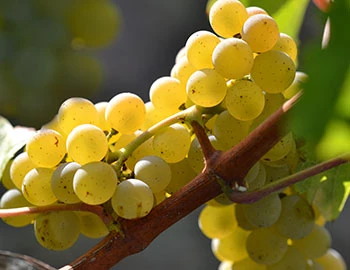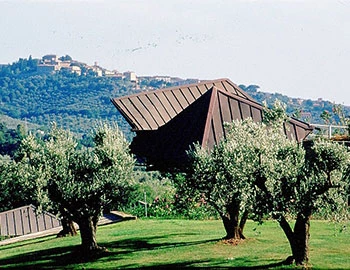Vie 2017
IGT Emilia-Romagna, San Patrignano, 750 ml

| Grape variety: | Sauvignon Blanc |
| Producer: | San Patrignano |
| Origin: | Italy / Emilia-Romagna |
Description
Bright pale greenish gold. Expressive nose of blackcurrant bud, gooseberry and citrus. Clean, fruity taste with a nice freshness and well balanced nervousness.
Attributes
| Origin: | Italy / Emilia-Romagna |
| Grape variety: | Sauvignon Blanc |
| Label: | Vegan |
| Ripening potential: | 2 to 8 years |
| Drinking temperature: | 10 to 12 °C |
| Food Pairing: | Mussels au gratin, Coquilles Saint Jacques on lentils, Asparagus specialities |
| Vinification: | fermentation of entire grape, partly destemmed, (short) pellicular fermentation, fermentation in steel tank |
| Harvest: | hand-picking, strict selection, in several rounds (tries) |
| Maturation: | in steel tank |
| Bottling: | filtration |
| Volume: | 13.0 % |
| Note: | Contains sulphites |
Sauvignon Blanc
The Sauvignon blanc can be recognized with your eyes closed. Its typical bouquet is marked by green notes: freshly cut grass, tomato bunches, gooseberry. Citrus fruits, cassis and flint join into the mix. In warmer latitudes it also shows exotic aromas, such as passion fruit. Its acidity is decidedly lively. In all likelihood, it comes from the Loire Valley, where it is vinified in Pouilly-Fumé and Sancerre in its purest form: varietally, and without timber. In the 18th century, it found its way to Bordeaux. Ambitious producers assemble it there with Sémillon into substantial whites, which are aged in oak barrels. The Sauvignon blanc has been a sensational success in the past 20 years in New Zealand. With its refreshing sweet-and-sour style, winemakers from down under have conquered the world. The rich Sauvignons from Styria and crisp examples of South Tyrol and Friuli are worth mentioning as well. It pairs with anything from the sea. Or do it like they do on the Loire, and enjoy it with goat cheese.

Italy
Italy – Where wine is a way of life
The Italian wine regions are extremely diverse, and this is made clear in their wines. Established varieties such as Merlot, Syrah, and Sauvignon can be found on just 15 percent of the total vine growing area. The remaining 85 percent is reserved for autochthonous, indigenous varieties. More than 2,000 different grape varieties are grown under diverse conditions and pressed with various techniques into wines that reach the top tier of the international wine market.



